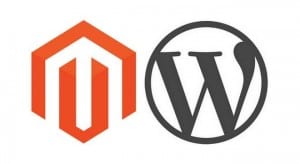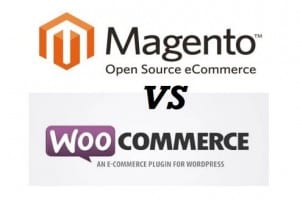Setting up your first eCommerce website is a big undertaking and your choice of eCommerce platform can either make or break your chance of success. Therefore it is important to make sure you choose the right eCommerce platform first time round.
Your platform not only needs to have great features and functionality so you can build a unique and engaging ecommerce store, but it also needs to be scalable so you know that as your business grows in the future, it will still be able to meet your needs and requirements.
A wide choice of ecommerce platforms
Today there certainly isn’t a shortage of great ecommerce platforms on the market, with offerings including WordPress, Woocommerce, Joomla, Opencart, Pretashop, Shopify, Virtuemart, Drupal, Big Commerce and of course Magento; the sheer volume of options alone can often leave business owners feeling a little overwhelmed.
Magento is arguably the best ecommerce platform available, but it is not necessarily the right choice for every business. With this in mind, we decide to provide a Magento comparison with other leading eCommerce platforms.

Magento is the best choice for businesses aiming to sell lots of products online, whereas WordPress is great for those who want to focus on sharing information and content.
Magento vs. WordPress
Both Magento and WordPress are fantastic content management systems that install pre-loaded with a wide range of features that help retailers to set up highly functional online stores. However at the end of the day, WordPress was designed to be a content management system and not an eCommerce platform, so if it’s your primary aim is to sell products online, Magento will make a better choice.
If on the other hand, your aim is to focus on web content and providing users with information, but you want to sell a few products on the side, WordPress will best fit your needs.
In terms of usability, WordPress is much easier for less- savvy web users as Magento has quite a steep learning curve. However with the right Magento Developer on your side, you will be able to get much more out of this platform, if selling products online is your goal.
For more information read on here: https://ecommercedesign.agency/magento-vs-wordpress
Magento vs. Woocommerce
WooCommerce is an open source plugin designed to add eCommerce functionality to WordPress websites. Since launching in 2011, it has quickly become a popular eCommerce platform for small businesses.
One of the advantages of WooCommerce is that it is a very user friendly system, meaning it is easier for merchants to understand than Magento; however Magento allows far greater customisations and is packed with greater out-of-the-box features.
WooCommerce is a more economic option for small businesses that require a fully functional eCommerce store, though if you are looking for a scalable option that will allow you to completely customise your eCommerce store, Magento will make a better choice.
For more information read on here: https://ecommercedesign.agency/magento-vs-woocommerce
Magento vs. Joomla
Joomla is a free, open source content management system. It offers many of the same features as WordPress, however it is known for being far more complex, often requiring the knowledge of an experienced web developer.

Joomla is an advanced CMS but requires the use of the Virtuemart plugin for eCommerce functionality.
If your primary focus is to build a high end website that offers users high quality content, Joomla will make a great choice. However if your main focus is to build an eCommerce store, you are advised to choose Magento. In order to turn Joomla into an eCommerce platform, you will need to use the Virtuemart plugin, which isn’t as well known for great usability or customisation options.
For more information have a read of our full comparison: Magento vs Joomla
Magento vs. Opencart
Opencart is open source, PHP based software, just like Magento, however it is primarily targeted at small to medium sized businesses.
If you are looking for a simple eCommerce solution then Opencart will make a great choice. It is great for businesses on a budget and will provide all the features you need to get your store up and running quickly.
If however you are looking to buy a professional eCommerce solution, Magento will make a far better choice. Whilst it may be slightly more complex in design, it boasts excellent out of the box features and great functionality that will allow you to create the eCommerce store you’ve always dreamt of owning.
For more information have a read of our full comparison: Magento vs Opencart
Magento vs. Shopify
Shopify is a fast-growing eCommerce platform that is popular with small businesses and start-ups. Unlike Magento it is proprietary software so merchants have to pay a monthly fee to use it. One of the great aspects of Shopify is that it’s very simple to use. You don’t have to buy your own hosting and you have access to hundreds of useful apps from the Shopify app store.
Those looking to set up a basic eCommerce store quickly will greatly benefit from choosing Shopify; however it is worth considering its limitations before making your decision. Shopify has nowhere near the amount of features that Magento provide and it also offers limited customisation options. If you want to be able to create a truly unique and bespoke eCommerce store, Magento will make a far better choice of eCommerce platform.
For more information see our full comparison: Magento vs Shopify
Magento vs. Drupal
Drupal is an advanced content management system that is great for creating, managing and publishing website content. With the use of extensions like Drupal Commerce, the platform can also be used to create eCommerce stores. Like Magento, Drupal is open source and requires the user to buy hosting.
One of the main advantages of Drupal is that it’s a highly functional CMS, so if you’re looking to create content and just sell a few products on the side, it’ll make a great choice of platform. If however you want to focus on selling products first and creating content second, then you will be much better off choosing Magento as your eCommerce platform.
Whilst Drupal is first and foremost a content management system, Magento will always be a world leading eCommerce platform.
Find out more by reading our comparison: Magento vs Drupal
Magento is still number 1
Even though new eCommerce platforms are popping up all of the time, Magento remains the industry leading solution. In addition to holding 26% of the market share, Magento is also the top choice of huge eCommerce brands like Nike, Olympus and Rosetta Stone. It doesn’t take a rocket scientist to realise just how great Magento is. With supreme modular architecture, excellent out of the box features and extensive customisation options; it’s clear to see why it’s the best free eCommerce solution.
For more information about Magento and how it compares to other leading ecommerce platforms or for advice on the best eCommerce platform for your business, feel free to contact us.
Image credits: ZERGE_VIOLATOR, alexisbellido, Higimo, Shopify and Janusman




